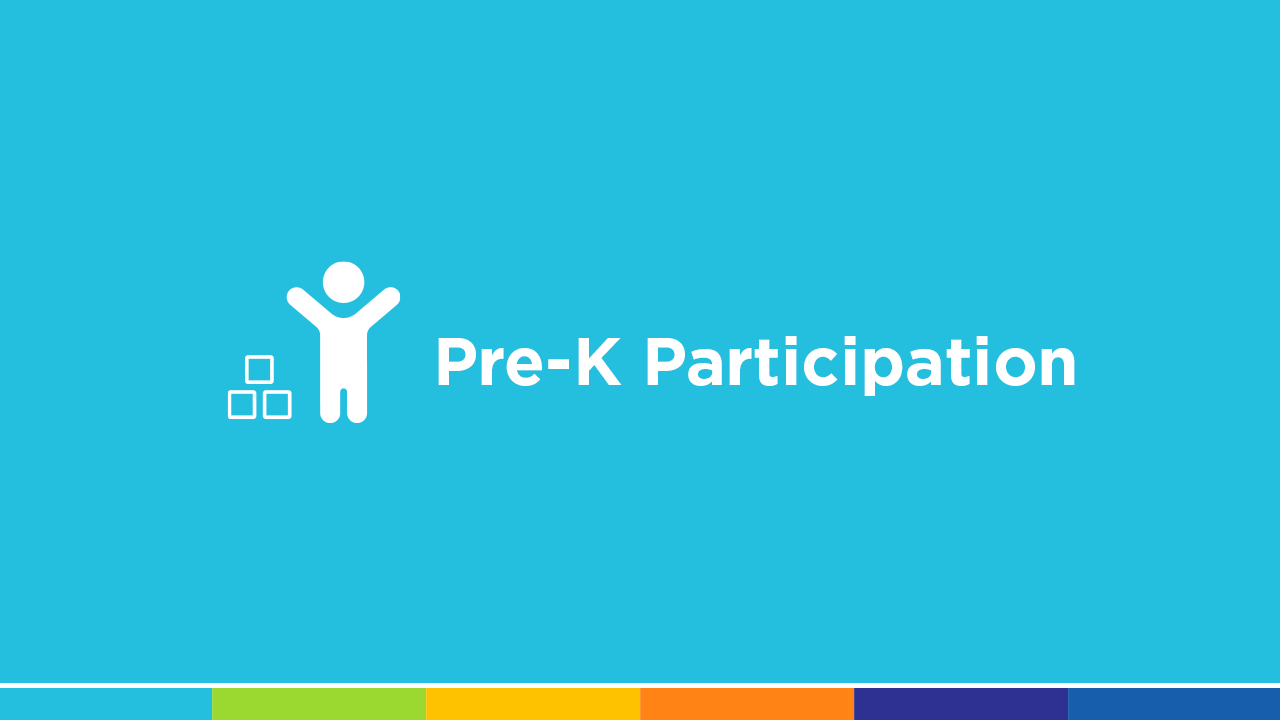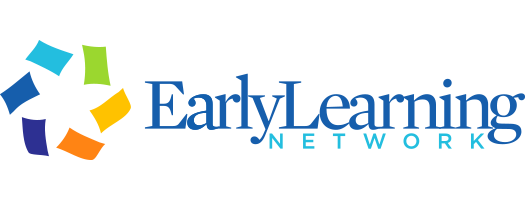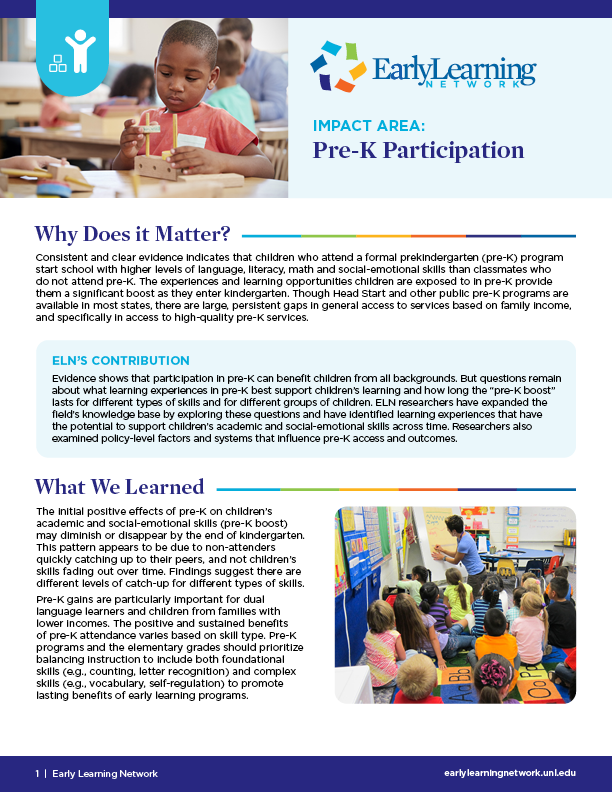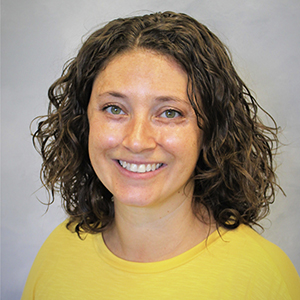
06 Jun Impact Area: Pre-K Participation
Early Learning Network research supports prioritizing instruction in both foundational skills and complex skills to promote lasting pre-K gains.
Early Learning Network (ELN) teams recently released a set of briefs focused on four impact areas — factors open to change or improvement — that have potential to narrow opportunity gaps and help children maintain early learning success as they transition from prekindergarten (pre-K) to elementary school and beyond.
The primary goal of these briefs is to inform practice and policy decisions that support equitable and effective learning opportunities for children.
This blog highlights the network’s collective research associated with the impact area of Pre-K Participation, including a key takeaway, action steps for practice, policy and research, and insights from the field.
Research Highlights
Pre-K Participation
Why does participation in high-quality pre-K matter?
Research shows children who attend a formal pre-K program have better language, literacy, math and social-emotional skills when they start school compared to those who do not attend pre-K. The experiences and learning opportunities provided in pre-K give children a significant advantage as they enter kindergarten — often called a pre-K boost. However, there are still large, persistent gaps in access to pre-K services, especially for families with lower incomes. While programs like Head Start and public pre-K are available in many states, not all children have equal access to high-quality pre-K services. Identifying ways to enhance the quality of children’s pre-K experiences is important for promoting more equitable early learning outcomes, particularly for students from marginalized groups.
What has the network contributed to the field in this area?
Evidence shows that participation in pre-K can benefit children from all backgrounds. But questions remain about which specific learning experiences in pre-K are most effective and how long the pre-K boost lasts for different types of skills and groups of children. ELN researchers have expanded the field’s knowledge base by exploring these questions and identifying learning experiences that can support children’s academic and social-emotional skills over time. Researchers also examined policy-level factors and systems that influence pre-K access and outcomes.
What is the network’s key takeaway regarding pre-K participation?
After analyzing the network’s collective research findings on pre-K participation, and integrating feedback from geographically diverse practitioners, policymakers, and state and federal partners, a key takeaway emerged:
Pre-K programs and the early elementary grades should prioritize instruction in both foundational skills (e.g., counting, letter recognition) and complex skills (e.g., vocabulary, self-regulation) to promote lasting pre-K gains, particularly for students who are marginalized.
Action Steps
To implement this key takeaway, the following action steps are suggested:
For Practice:
- Provide pre-service and in-service educators, administrators and support staff with high-quality professional learning opportunities, including customized training and coaching, to support consistent use of evidence-based and play-based instructional activities and curricula that promote children’s skills across multiple domains (e.g., academic, social-emotional).
For Policy:
- Integrate pre-K programs with K-3 through joint professional development; delivery of common and aligned instructional programs and assessments; use of common metrics for classroom/program quality and integrated data systems to address fade out.
- Improve working conditions and compensation for the early childhood workforce.
For Research:
- Study policies to ensure children have equitable access to programming that includes high-quality pre-K learning experiences, particularly for students from marginalized populations.
Insights from the Field
Vanessa Shrontz, preschool team lead for the A. Sophie Rogers School for Early Learning at Ohio State University, served on the steering committee for the ELN Forum and contributed to the development of the takeaway and action steps.
In this next section, she offers insights on the network’s findings related to pre-K participation.
Practice-Focused Insights
While foundational skills are crucial for children — like being able to count to 10 and identify 26 letters — Shrontz emphasized the importance of fostering more complex, critical-thinking abilities to pave the way for lifelong success.
“Ideally, you want children to enter kindergarten with a strong educational base, but those foundational skills can be learned,” Shrontz said. “When their brains are developing in the early years, those more complex skills — vocabulary, self-regulation and understanding things like cause and effect — are more long-lasting and are what children need to be successful, not only in kindergarten through third grade, but for life in general.”
At the A. Sophie Rogers School, there is a significant focus on play and differentiating instruction based on individual children’s levels.
Schrontz noted that teachers in her classroom leverage the children’s existing interests to ask open-ended questions and engage them in conversations throughout the day. In doing so, they can promote skills across multiple domains.
“Play-based learning is much more fun and engaging it involves something the kids are interested in, like dinosaurs and space. In my classroom right now, we are making Pokémon cards to help kids learn letters and numbers. We can also practice turn-taking through Pokémon memory games and strengthen their fine-motor skills by doing coloring pages with the characters,” Shrontz said. “And because I know nothing about Pokémon, they get to become the teacher and flip roles with me. So, there’s also that social-emotional piece, because they see how they’re part of a community, and everyone, regardless of age or role in the classroom, has something to offer.”
For teachers like Shrontz, high-quality professional development opportunities are welcome — but available offerings tend to be underwhelming.
“Our directors strive to find high-quality trainings for us; however, most of them provide baseline training,” Shrontz said. “They may offer a nice refresher, and you might take away one or two new things, but they are often not challenging teachers enough. From my experience, teachers would benefit from trainings that extend things further by including high-quality research and new, exciting things, like how to best use reflective practices.”
Policy-Focused Insights
One way to ensure a smooth transition from pre-K to kindergarten is to implement policies that integrate pre-K programs with K-3 educational systems.
As an example of this integration, Shrontz shared that the state of Ohio uses a set of Early Learning and Development Standards that encompass children’s development from birth to age 6. These standards establish shared expectations for young children’s learning and development, while illustrating connections to Ohio’s K-12 standards.
According to Shrontz, these standards promote continuity between pre-K and formal school.
“These standards help both teachers and parents know what comes next in the learning continuum,” Shrontz said. “We use them to develop our curriculum. For example, I might say, ‘Okay, this is my base activity. What is a step down from this? What is a step up from this?’ They help inform some of those conversations about whether a child needs services or whether they need to be pushed a little bit further.”
Shrontz agreed with the need to lift up policies that improve working conditions and compensation for the early childhood workforce.
“Making ends meet, whether you’re on your own or raising a family, is incredibly challenging for pre-K teachers — not to mention student loans and things like that,” Shrontz said. “Perhaps a solution is a state or government subsidy — but we can’t keep expecting people who live in or near poverty to care for our most important and vulnerable population.”
The next blog will explore another impact area that emerged from the network’s research: Classroom Experiences and Learning Opportunities.



